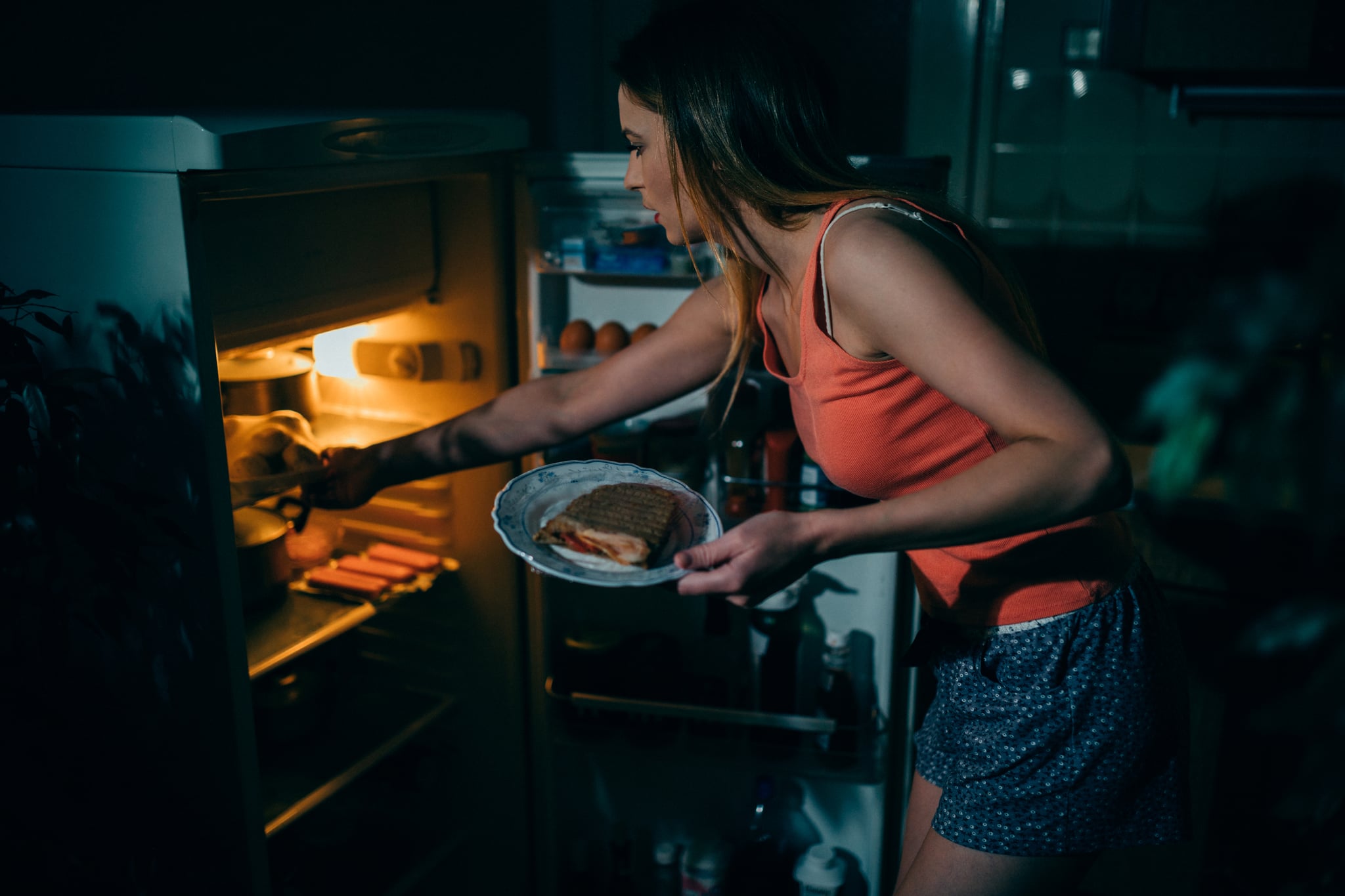

A few nights ago, it hit 10 p.m. and I realized: oh no. I was hungry.
I try not to eat past 9 p.m. Many a midnight burrito in college taught me that late-night snacks just don't work for me; inevitably I end up going to bed bloated and waking up either with a stomachache or, somehow, ravenously hungry. But at the same time, going to bed starving feels like I'm depriving myself, and sleep doesn't exactly come easy when your stomach is actively rumbling. Finding that balance is hard, especially when you hear about how eating before bed has the potential to lead to weight gain, or can at least stand in the way of any weight loss goals you might have.
Will Eating Before Bed Make Me Gain Weight?
If you're truly hungry - no matter the time of day, even if you're trying to lose weight - you should eat something, said Erin Coates, a registered dietitian at Cleveland Clinic Wellness. "Your body is pretty good at gauging when you need nourishment," she told POPSUGAR. The only problem with eating at night, she said, is that it's a time when you might be more prone to eat out of habit, instead of out of hunger.
The solution to that is to investigate why you're actually eating at night. "Be aware of where your emotions are in regard to night-time eating and where your hunger levels fall," Erin said. Are you just reaching for a snack out of habit, or because you feel stressed or worried, or are you actually hungry?
It's hard to figure out whether you're really hungry, but doing so can help you fight overeating and weight gain. Erin's trick is to do it at night, when treats abound: turn on a bright light overhead, put away or turn off all distractions (like your phone or TV), and sit at your table with your snack. Focus and ask yourself if you're eating out of habit or out of true hunger. "This simple act can help keep you mindful of what and how much you're eating," Erin told POPSUGAR.
How Late Should I Eat to Lose Weight?
"I like to suggest closing the kitchen at least two hours before bed, if possible," Erin said. You don't want your digestive system to be working overdrive throughout the night, she explained; your body should be focused on rest, repair, and rejuvenation, not digestion. Eating right before bed, and especially eating something unhealthy (more on that later) can disrupt your sleep or leave you tired in the morning.
It's fine to grab a small snack before bed every now and then, but if you have a hard time waiting two hours between eating and sleep, "it might be wise to re-evaluate how much you're eating during the day," Erin told POPSUGAR. You may need to add more fiber, lean protein, or healthy fats to make your daytime meals and snacks more filling. Try these quick, satisfying breakfast recipes or these healthy dinner ideas.
What's the Best Bedtime Snack For Weight Loss?
If you're really hungry before bed, Erin gave a couple of healthy snack suggestions to keep you on track with your weight loss goals.
- Dried apricots and an ounce of 70+ percent dark chocolate: Late-night sweet craving? Same. Dark chocolate can help satisfy that, Erin said, while providing healthy antioxidants like flavonoids. The apricots also contain antioxidants as well as tryptophan, which Erin said helps to provide your body with melatonin (a hormone that can help regulate your sleep-wake cycle.)
- Six ounces of plain yogurt, half a banana, and cinnamon: Bananas give you potassium and magnesium, minerals that Erin said can relax your muscles and help you sleep. The yogurt, meanwhile, provides lean protein to help you stay satisfied.
- One-fourth cup mashed avocado: Avocado satisfies your hunger (healthy fats!) and provides nutrients like magnesium and tryptophan that help you sleep better, Erin told POPSUGAR.
- One tablespoon of almond butter: "Almonds are a natural source of the sleep-regulating hormone melatonin, as well as healthy fats to take the edge off your hunger," Erin said.
You want to avoid eating greasy, high-fat foods, such as anything fried, heavily-processed meats, and rich desserts, Erin said. "These foods take a toll on your digestion and can actually cause you to feel more tired and sluggish in the morning," she explained. Foods with lots of sugar can also mess with your sleep by causing dips and spikes in your blood sugar levels. And losing sleep translates to lower energy the next day, Erin added, leading you to crave sugary foods and setting you farther back in your weight loss goals.
"Eating a small snack that is 100-200 calories right before bed is likely not going to hinder your progress on the scale, if you have true stomach rumblings in the evening," Erin said. Intense hunger might actually wake you up during the night, and remember that quality sleep is key for weight loss too. The key is to replace any old, less healthy nightly snack habits with new routines. If you realize you're not actually hungry, Erin suggested, "try stretching or some gentle yoga, talking with your partner or housemate, journaling, or calling a friend instead." You'll get the same stress-relieving reward, minus the potential setback in your weight loss journey.
But if you are hungry? Grab a small, healthy snack and enjoy it. You don't need to go to bed starving in the name of losing pounds.



0 comments :
Post a Comment